
Tal Chitayat noticed the waste for the first time about two miles into Manhattan. Running the New York City Marathon last year, he had already trod through Staten Island, Brooklyn and Queens and was coming up on Mile 17. Only nine more miles to go.
At that point, race assistants give runners a cool-down sponge as part of a cooling and hydration station.
Chitayat took the sponge, wrung it out over his head, and wiped the sweat out of his eyes. And then he looked down.
“It was just block after block of green carpeting made out of these sponges,” Chitayat said. “That’s 45,000 plastic sponges being used for maybe three seconds before ending up in a landfill.”
To Chitayat, the owner of Full Circle, a household products company that uses natural and recycled materials (it’s also a certified B corporation), there was an opportunity for a partnership with the New York City Road Runners, the organization that puts on the NYC Marathon.
For the 49th annual New York City Marathon, which will be run this weekend, Full Circle has donated 45,000 biodegradable cellulose sponges. It’s part of the brand’s #StartWithASponge campaign, asking consumers to make the switch from the regular sponges made of polyurethane to its sponge made of plant pulp.
It helped that the Road Runners had recently untaken their own sustainability initiatives. The group is a signatory of the United Nations Framework Convention on Climate Change’s Sports for Climate Action Initiative. The Road Runners were able to divert 82% of the 222 tons of waste produced by 2018’s marathon and recycled.
Consumers are increasingly making sure their purchasing decision aligns with brands that support the environment. In a survey of future marketing trends by the consulting firm Deloitte, more than 80% of consumers would be willing to pay more if a brand “raised its prices to be more environmentally and socially responsible.”
Brands have taken the hint. First, it was the straw. Then the miniature shampoo bottle and the plastic water bottle. But, according to Chitayat, consumers often don’t consider the everyday products in their own homes, chief among them the humble sponge.
In the United States, more than 400 million sponges are thrown away every year. Most of these are made of plastics that break apart and seep into the water supply and our environment.
While the science is still developing on how dangerous microplastics are for human health, according to the National Oceanic and Atmospheric Administration over 600 species of marine wildlife have been found to have ingested microplastics, causing poisoning and complications with reproduction.
“So much of the [sustainability] conversation is driven by our on-the-go culture. It’s water bottles, straws, coffee cups… Those require very little changes to our everyday routine. You don’t need a water bottle to survive,” Chitayat said. “It’s our responsibility as a brand to provide alternatives that can really change the impact you’re having on an everyday level.”
Chitayat isn’t running the race this year, crediting a 1.5-year-old child at home, but plans on running next year.
“There’s no experience like the New York City Marathon,” Chitayat said. “You’re seeing the whole city, there’s so much energy, everyone’s out there cheering you on, the whole city feels like one small community.”
https://www.adweek.com/brand-marketing/new-york-city-marathon-natural-sponges/

